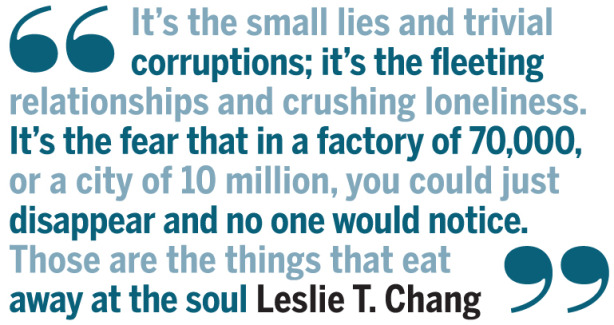Made in China: Tech, Ethics and Economics
September 1, 2010 | 07:28

You could just disappear
So what does all this mean for the 10 people who took their lives during those turbulent five months at Hon Hai? The answer is likely very little.Back in the 1990s, multinational clothing and footwear brands such as Gap, Levi's and Nike came under huge public pressure following reports that they were selling products made in sweatshops employing child labour in developing countries. Beleaguered by product boycotts and student activism, the industry was forced to change, eventually introducing proper checks and balances. Electronics has yet to go through the same process.
“The only one that has really explicitly talked about human rights is Hewlett-Packard,” said Arvind Ganesan, director of the business and human rights program for Human Rights Watch in New York. “The industry in general has not been vocal on human rights issues. It goes back to companies not addressing things proactively but rather waiting until they have a problem.”
Ganesan hopes that with a high-profile like Apple now part of the story, momentum will gather and issues will be addressed. But so far there has been no discernable slowdown in demand for iPhones, iPads and iPods.

As to the significance of the deaths to the manufacturing sector as a whole, Leslie T. Chang, author of China Girls: From Village to City in a Changing China, offers some interesting insight. In a recent commentary Chang swung the spotlight away from factory conditions and onto the narratives of the workers themselves: the struggles of young people, with little experience of the world, trying to adjust to a new life far away from home.
“In 2004, when I started reporting my book in Dongguan, my starting point was the issue of working and living conditions in factories,” Chang wrote. “Over the course of three years, as I came to see the city through the eyes of migrants, I learned that it is other factors that make city life hard. It’s the small lies and trivial corruptions; it’s the fleeting relationships and crushing loneliness. It’s the fear that in a factory of 70,000, or a city of 10 million, you could just disappear and no one would notice. Those are the things that eat away at the soul.”
It is possible that in time the suicides at Hon Hai which precipitated the pay rises will come to be seen as a landmark in the China story; the day the scales finally tipped in favor of the workers and the era of limitless, low-end, low-cost labour came to an end. Equally, they may just disappear into the folds of a much larger and longer-term transition in the Chinese economy.
Viewed in the present, though, these workers are in a way the indirect casualties of an economy growing at warp speed. China is going through industrialization and urbanization at an unprecedented pace: industries post double-digit expansion, there are huge spikes in demand for commodities, vast infrastructure projects appear almost overnight, and new markets emerge capable of making or breaking ambitious entrepreneurs.
The evolution is as brutal as it is spellbinding to the people and social systems at the eye of the storm. For some, fortunes have been made; for others, dreams have been crushed.

MSI MPG Velox 100R Chassis Review
October 14 2021 | 15:04








Want to comment? Please log in.